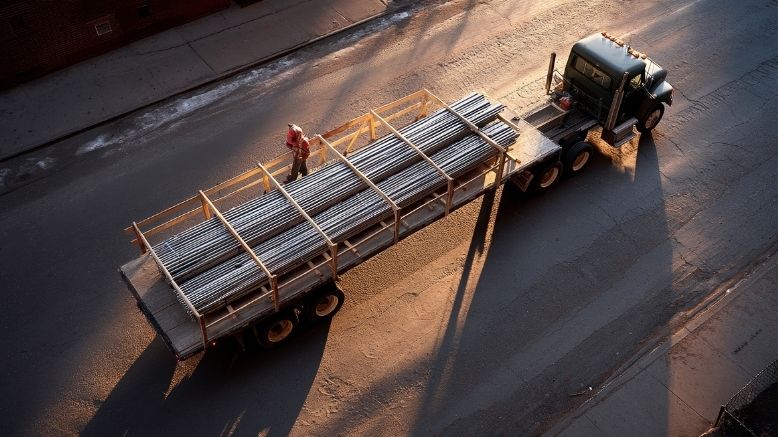— 10 min read
The Role of a Foreman in Construction


Last Updated Jul 31, 2025

Tramel Smith
Superintendent
Tramel Smith is a superintendent a RNGD, a sister company of Impetus with a focus on architectural fabrication, steel, design and innovation. He brings nearly a decade of experience working as a construction superintendent on a variety of types of projects. Tramel lives in New Orleans, Louisiana.

Kristen Frisa
Contributing Writer
113 articles
Kristen Frisa is a contributing writer for Procore. She also contributes to a variety of industry publications as a freelance writer focused on finance and construction technology. Kristen holds a Bachelor of Arts in Philosophy and History from Western University, with a post-graduate certificate in journalism from Sheridan College. She lives in Ontario, Canada.
Last Updated Jul 31, 2025

The foreman is the person on-site the superintendent trusts to take on leadership roles within jobsite crews, who has demonstrated the ability to take direction and make sound decisions and can be delegated tasks with faith that the job will get done.
This article will detail the role of the foreman in construction, including qualities of a great foreman and potential career paths.
Table of contents
The Responsibilities of a Foreman
Foremen often work within their original trades or specialties but take on a leadership or supervisory role among their peers. Superintendents assign foremen specific tasks or responsibilities as needed. Depending on the size and type of construction project, there may be multiple foreman on each jobsite, each with a crew to handle a task.
Opening the Jobsite
In some cases, foremen may be tasked with opening the gates to the jobsite each morning, signing in laborers and getting them started on their first jobs of the day.
Being the Eyes and Ears of the Superintendents
As they work closely with crews on site each day, foremen understand the nitty-gritty of what's happening there. That's why superintendents rely on foremen to keep them informed about anything that might need attention. For instance, foremen may recognize when equipment needs servicing or repairs and notify the superintendent, who will proceed to schedule the work.
Managing Subcontractors
Foremen aren't generally in charge of scheduling subcontractors' work on-site. However, when crews are present, it falls on the foremen to ensure everyone is working together smoothly and understanding the bigger picture.
Subcontractors plan to complete their tasks in the order they believe is most efficient. Occasionally, conflicts may crop up when two crews want to be in the same area at the same time, but it won't work for them both to work simultaneously.
The foreman may wind up in charge of solving the conflict by arranging the two crews' schedules so that they'll be most effective.
Managing Material Deliveries
Jobsites sometimes receive multiple deliveries of materials and supplies each day. A foreman would oversee the process of unloading, conducting quality control checks (and noting any damaged goods on delivery) — and shunting the deliveries where they need to go for storage or immediate use.
One-off Tasks
Foremen are sometimes assigned tasks that could most accurately be called "odd jobs."
General contractors may self-perform some simple work on projects to save from giving the task to a subcontractor. A GC who does some self-perform carpentry may assign some blocking or framing work to a foreman.
Occasionally, foremen are assigned tasks not included in the subcontractors' scope of work. For example, when the project involves roofing where blocking required at the parapet cap gets missed. The wall framer and the roofer have yet to be assigned this portion of the project, so the general contractor may decide to keep the work in-house and assign it to a foreman.
Differentiating the Foreman, Superintendent and Project Manager
How does the role of a foreman compare to that of a superintendent or PM? A foreman works under the leadership of the superintendent, who will determine the next tasks for completion and assign a crew to each. The foreman and the superintendent work together on the jobsite each day, executing the work to reach project completion, learning the ins and outs of how to build things and how to communicate with people in the construction field.
In contrast, the project manager spends time on site and in the office, budgeting, scheduling, negotiating contracts, and ensuring site staff have all they need to keep working each day. The office side involves a completely different skill set from a project foreman in a different world.
How does the foreman role change between project types?
A construction foreman is a leader among laborers, answering up to the project superintendent and providing information to help the project run smoothly. However, the foreman's role can change depending on the type of project at hand.
Commercial
Commercial construction projects tend to involve large jobsites and numerous foremen. On commercial sites, each foreman is given a specific responsibility to take on each day. For example, a foreman might be assigned to take care of site deliveries or to ensure pathways through the jobsite are clear or that the site is meeting all of its safety protocols.
Structural Steel and Millwork
A foreman assigned to lead a crew on a steel job like a small steel repair or installing handrails on a staircase is one whose expertise is in steel. That foreman would understand the tools and material required, the safety protocols in place, and the documentation required for that job.
On a larger steel job, that foreman may be teamed up with a project superintendent and a number of other foremen. The superintendent would divide the work up, assigning one foreman columns and beams in one section and another to a second section. A third foreman might be assigned to put up some decking once the first two crews were done.
The role of the foreman is not so different working as a general contractor or a steel subcontractor, except that the work is much more specific to a certain skill set. The foremen on these jobs will still be assigned other tasks like receiving deliveries but overall, their tasks will be much more specific to the job at hand.
Heavy Civil
On heavy civil projects, foremen are assigned many of the same project and site-related tasks as on other construction projects. Foremen on civil projects might also be assigned to complete daily equipment checks. Civil projects often involve very large and very specific types of equipment that are critical to each day's work. Equipment down on a civil job may lead directly to project delays.
Infrastructure
There tend to be a lot more foremen on infrastructure projects than on other project types, and typically they behave as crew leaders. One foreman will be assigned to lead a number of pipe layers, laborers or operators so the foreman almost acts as a superintendent of a specific crew.
Infrastructure projects tend to work on a much smaller scale, where the jobsite might involve work on a street over a single city block. In that area there won't be as many contractors and employees to lead — there may only be a single crew and one or two subcontractors at any given time. The foremen on these projects have boots on the ground, leading work according to their areas of expertise, whether that's street repairs, water and piping, or something else. However, no matter what area a foreman is assigned to, they're expected to be flexible to do odd things on-site as needed.
The Career Path of a Construction Foreman
Project foremen are generally built through jobsite experience. Many construction foremen began their construction careers as laborers on construction projects.
1. Begin as a laborer.
Construction laborers can begin straight out of high school without any construction experience, cleaning the job site, moving materials, and completing any other miscellaneous tasks as they come up.
Construction laborers often get certified in one of the skilled trades on site. Finally, as trades workers become more experienced and show initiative and leadership, they can become a foreman on a jobsite.
2. Graduate from trade school or a degree program.
A foreman may learn a trade from a trade school or complete a construction management degree and go directly into a foreman role, but generally speaking, foremen begin as laborers, learn how to navigate and run a site through personal experience — and find they excel at leadership in the field.
3. Be promoted from foreman to superintendent.
For a good project foreman, the sky is the limit in terms of career growth. After earning experience and proving the ability to handle crews in a leadership role, a project foreman could be promoted to work as an assistant superintendent, and then become a superintendent.
Construction superintendents work on bigger and more complex projects the more experienced they become, and then may have a chance to move into a senior superintendent role. Finally, some superintendents will become general superintendents, who can be thought of as the superintendent of superintendents.
By the time professionals reach this level, their experience has been proven time and again. They will have come into contact with innumerable scenarios and can lead teams through troubleshooting, problem-solving, and resolution through any situation.
Learn more: Career Paths to Management in Construction
What does it take to be a great construction foreman?
Foremen are expected to read and interpret a schedule to determine next tasks, understand what people, equipment, and materials they need to complete those tasks, and the steps they'll take to complete them.
Along with these soft skills, foremen are also expected to have expertise in the workings of the jobsite and within their specific skill sets, and enough technological proficiency to use construction management software to complete logs and communications as needed.
Stay updated on what’s happening in construction.
Subscribe to Blueprint, Procore’s free construction newsletter, to get content from industry experts delivered straight to your inbox.

Critical Thinking and Analysis
Foremen are workers who've proven their drive, ability to think critically, and communication skills with those around them. They have demonstrated the ability to take direction and familiarity with the work so that superintendents are confident in their abilities to get results with their teams. Foremen are not expected to have all the answers, but they are people who understand the questions to ask to get to each next step.
Importantly, good foremen also understand when they're out of their depths and need to get further direction before proceeding with any other work.
Interpersonal Skills
Construction is a people business, and anybody who makes it to a leadership role needs to know how to communicate effectively with different types of people. A foreman has to set out to achieve success with all the other people on the jobsite.
A rude or ineffective foreman may scuff up relationships between subcontractors, the general contractor, or any of the laborers on site, and it could reflect poorly on the superintendent or on the company as a whole.
The ability to communicate to resolve conflict amicably between parties or get a point across so that nobody construes it the wrong way is definitely a big skill to have in any construction leadership role.
Leadership Capabilities
Leadership can be a tricky skill set to pin down — what exactly makes a good leader? When it comes to the role of construction foreman, part of the job is making sure everyone can work together harmoniously. To make that happen, it's helpful to make sure that workers understand their own roles in making the project work.
A laborer could be sweeping the floor in what could feel like a menial task, but that job is important to that project and to the company because if they weren't doing that well then the site could get messy, reflecting poorly on the company. Safety issues may arise thanks to trip hazards.
Everybody's role on the site is important. Foremen must be able to communicate that to improve buy-in and pride in the work.
What's next for construction foremen?
As time passes, the construction jobsite is changing thanks to new technology. The continued rise of prefabrication may result in less time and active processes occurring on site. Tools are improving daily, and artificial intelligence is helping steer activities to optimize efficiency and productivity.
Through it all, foremen will remain an important part of construction's on-site leadership team, carrying out the tasks that move a project toward completion. Good foremen that show critical thinking and analytical skills, work well with people and are experts in their areas of knowledge will continue to be critical to successful construction projects.
Was this article helpful?
Thank you for your submission.
100%
0%
You voted that this article was . Was this a mistake? If so, change your vote
Scroll less, learn more about construction.
Subscribe to The Blueprint, Procore’s construction newsletter, to get content from industry experts delivered straight to your inbox.
By clicking this button, you agree to our Privacy Notice and Terms of Service.
Thank you!
You’re signed up to receive The Blueprint newsletter from Procore. You can unsubscribe at any time.
Categories:
Written by

Tramel Smith
Superintendent
Tramel Smith is a superintendent a RNGD, a sister company of Impetus with a focus on architectural fabrication, steel, design and innovation. He brings nearly a decade of experience working as a construction superintendent on a variety of types of projects. Tramel lives in New Orleans, Louisiana.
View profile
Kristen Frisa
Contributing Writer | Procore
113 articles
Kristen Frisa is a contributing writer for Procore. She also contributes to a variety of industry publications as a freelance writer focused on finance and construction technology. Kristen holds a Bachelor of Arts in Philosophy and History from Western University, with a post-graduate certificate in journalism from Sheridan College. She lives in Ontario, Canada.
View profileExplore more helpful resources

6 Tips to Turn Construction Culture Into Daily Practice
Every construction company has a culture. Whether it’s intentional or not. The difference lies in how that culture shows up on the job. In the first article of this series on...

Turning Values into Workflows: How a GC Firm Operationalized Culture
Culture isn’t just about what companies believe — it’s about how those beliefs show up in day-to-day work. When culture is embedded into operations, it becomes something teams can rely...

How a Successful GC Firm Turned Personalities into Culture
The culture at Ryan Gootee General Contractors (RGGC), a successful construction firm based in New Orleans, was never something the company had to invent. It was always there. Woven into...

Rise of the Super-Sub: Mastering Supply Chain & Logistics for Offsite Construction
Modern construction projects come with ever-increasing demands. Owners want to see more complex builds completed on tighter schedules. At the same time, general contractors (GCs) face challenges like the ongoing...
Free Tools
Calculators
Use our calculators to estimate the cost of construction materials for your next project.
Templates
Find a template to help you with your construction project tasks.
Material Price Tracker
Get the latest U.S. retail prices and view historical trends for common building materials.
Glossary
Explore key terms and phrases used in the industry.
